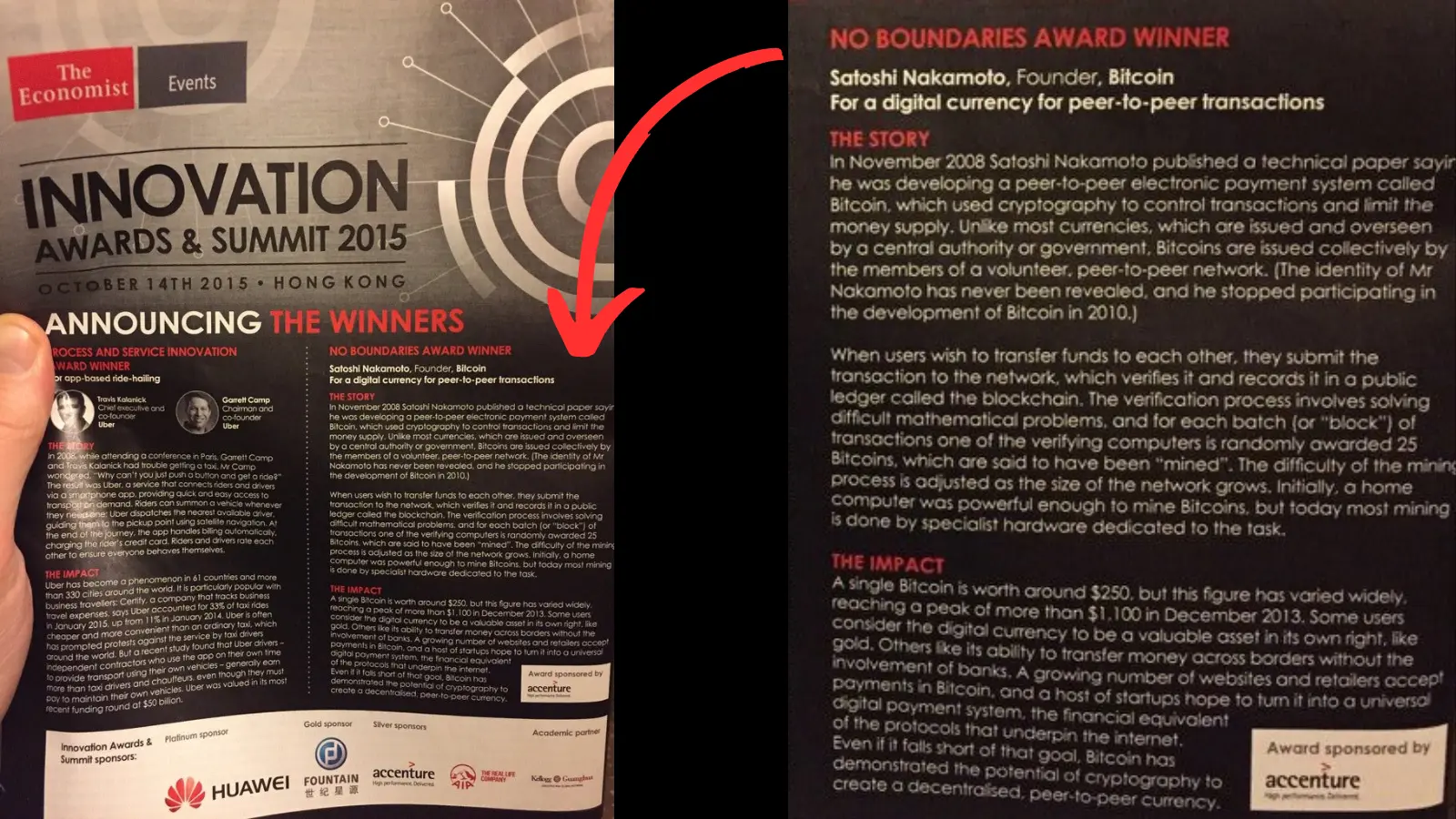14 October 2015

Bitcoin creator, Satoshi Nakamoto was awarded the innovation prize by the Economist
On October 14, 2015, The Economist awarded Satoshi Nakamoto, the elusive founder of Bitcoin, as the recipient of an esteemed award for innovation.
As part of the Economist Innovation awards & summit 2015, Satoshi Nakamoto, the creator of Bitcoin was announced as the "NO BOUNDARIES AWARD WINNER" for "a digital currency for peer-to-peer transactions"
After which they explain the story and impact of Satoshi's contribution:
"THE STORY
In November 2008, Satoshi Nakamoto published a technical paper saying he was developing a peer-to-peer electronic payments system called Bitcoin, which used cryptography to control transactions and limit the money supply. Unlike most currencies, which are issued and overseen by a central authority or government, Bitcoins are issued collectively by the members of a volunteer, peer-to-peer network. (The identitiy of Mr Nakamoto has never been revealed, and he stopped participating in the development of Bitcoin in 2010.)
When users wish to transfer funds to eac, they submit the transaction to the network, which verifies it and records it in a publkic ledger called the blockchain. The verification process involves solving difficult mathematical problems, and for for each batch (or "block") of transactions one of the verifying computers is randomly awarded 25 bitcoins, which are said to have been "mined". Initially, a home computer was powerful enough to mine bitcoins, but today most mining is done by specialist hardware dedicated to the task.
THE IMPACT
A single Bitcoin is worth around $250, but this figure has varied widely, reaching a peak of more than $1,100 in December 2013. Some users consider the digital currency to be a valuable asset in its own right, like gold. Others like its ability to transfer money accross borders without the involvement of banks. A growing number of websites and retailers accept payments in Bitcoin, and a host of startups hope to turn it into a universal digital payments system, the financial equivalant of the protocols that underpin the internet. Even if it falls short of that goal, Bitcoin has demonstrated the potential of cryptography to create a decentralized peer-to-peer currency."
As part of the Economist Innovation awards & summit 2015, Satoshi Nakamoto, the creator of Bitcoin was announced as the "NO BOUNDARIES AWARD WINNER" for "a digital currency for peer-to-peer transactions"
After which they explain the story and impact of Satoshi's contribution:
"THE STORY
In November 2008, Satoshi Nakamoto published a technical paper saying he was developing a peer-to-peer electronic payments system called Bitcoin, which used cryptography to control transactions and limit the money supply. Unlike most currencies, which are issued and overseen by a central authority or government, Bitcoins are issued collectively by the members of a volunteer, peer-to-peer network. (The identitiy of Mr Nakamoto has never been revealed, and he stopped participating in the development of Bitcoin in 2010.)
When users wish to transfer funds to eac, they submit the transaction to the network, which verifies it and records it in a publkic ledger called the blockchain. The verification process involves solving difficult mathematical problems, and for for each batch (or "block") of transactions one of the verifying computers is randomly awarded 25 bitcoins, which are said to have been "mined". Initially, a home computer was powerful enough to mine bitcoins, but today most mining is done by specialist hardware dedicated to the task.
THE IMPACT
A single Bitcoin is worth around $250, but this figure has varied widely, reaching a peak of more than $1,100 in December 2013. Some users consider the digital currency to be a valuable asset in its own right, like gold. Others like its ability to transfer money accross borders without the involvement of banks. A growing number of websites and retailers accept payments in Bitcoin, and a host of startups hope to turn it into a universal digital payments system, the financial equivalant of the protocols that underpin the internet. Even if it falls short of that goal, Bitcoin has demonstrated the potential of cryptography to create a decentralized peer-to-peer currency."









